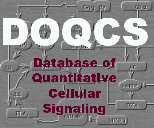
|
Enter a Search String | | Special character and space not allowed in the query term.
Search string should be at least 2 characters long. |
Molecule Parameter List for Glu | The statistics table lists the distribution of a molecule acting either as a substrate, product, enzyme or as a molecule within the network.
The text color of a molecule is highlighted by  color. color. | | Statistics |
| Glu participated as | Molecule | Sum total of | Enzyme | Substrate of an enzyme | Product of an enzyme | Substrate in Reaction | Product in Reaction | | No. of occurrences | 1 | 0 | 0 | 0 | 0 | 2 | 0 |
Accession and Pathway Details | |
| Accession Name | Accession No. | Accession Type | Pathway Link | MAPK_network_
2003 | 50 | Network |
Shared_Object_MAPK_network_2003, PKC, PLA2,
PLCbeta, Gq, MAPK,
Ras, EGFR, Sos,
PLC_g, CaMKII, CaM,
PP1, PP2B, PKA,
AC | | This is a network model of many pathways present at the neuronal synapse. The network has properties of temporal tuning as well as steady-state computational properties. In its default form the network is bistable.Bhalla US Biophys J. 2004 Aug;87(2):745-53 |
Glu acting as a Molecule in MAPK_network_2003 Network
| Name | Accession Name | Pathway Name | Initial Conc.
(uM) | Volume
(fL) | Buffered | | Glu | MAPK_network_
2003
Accession No. : 50 | Shared_Object_
MAPK_network_
2003
Pathway No. : 206 | 0 | 1000 | Yes | | Varying the amount of (steady state) glu between .01 uM and up, the final amount of G*GTP complex does not change much. This means that the system should be reasonably robust wr to the amount of glu in the synaptic cleft. It would be nice to know how fast it is removed. |
Glu acting as a Substrate in a reaction in MAPK_network_2003 Network
| Kd is calculated only for second order reactions, like nA+nB <->nC or nA<->nC+nD, where n is number and A,B,C,D are molecules, where as for first order reactions Keq is calculated.
Kd for higher order reaction are not consider. |
| | Name | Accession Name | Pathway Name | Kf | Kb | Kd | tau | Reagents | | 1 | RecLigandBinding | MAPK_network_
2003
Accession No. : 50 | Gq
Pathway No. : 210 | 16.8
(uM^-1 s^-1) | 10
(s^-1) | Kd(bf) = 0.5952(uM) | - | Substrate
Glu
mGluR
Product
Rec-Glu
| | | kf = kf from text = 1e7 / M / sec = 10 /uM/sec = 10 / 6e5 / # / sec = 1.67e-5 kb = kr from text = 60 / sec Note that we continue to use uM here since [phenylephrine] is also in uM. From Martin et al FEBS Lett 316:2 191-196 1993 we have Kd = 600 nM Assuming kb = 10/sec, we get kf = 10/(0.6 uM * 6e5) = 2.8e-5 1/sec/# | | 2 | Glu-bind-Rec-Gq | MAPK_network_
2003
Accession No. : 50 | Gq
Pathway No. : 210 | 16.8
(uM^-1 s^-1) | 0.1
(s^-1) | Kd(bf) = 0.006(uM) | - | Substrate
Glu
Rec-Gq
Product
Rec-Glu-Gq
| | | From Fay et al kb3 = kb = 1.06e-3 which is rather slow. k+1 = kf = 2.8e7 /M/sec= 4.67e-5/sec use 5e-5. However, the Kd from Martin et al may be more appropriate, as this is Glu not the system from Fay. kf = 2.8e-5, kb = 10 Let us compromise. since we have the Fay model, keep kf = k+1 = 2.8e-5. But kb (k-3) is .01 * k-1 from Fay. Scaling by .01, kb = .01 * 10 = 0.1 |
| Database compilation and code copyright (C) 2022, Upinder S. Bhalla and NCBS/TIFR
This Copyright is applied to ensure that the contents of this database remain freely available. Please see FAQ for details. |
|
